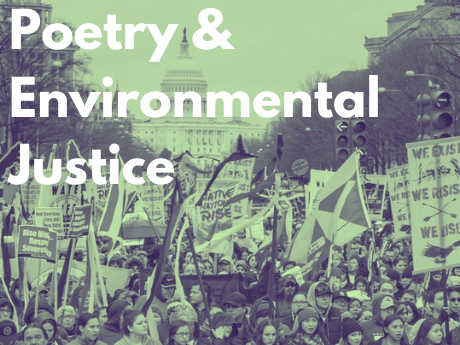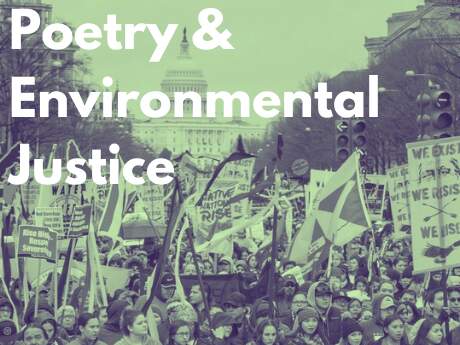Poetry & Environmental Justice
Craig Santos Perez on “Water Remembers” by Brandy Nālani McDougall

Water Remembers
Waikīkī was once a fertile marshland
ahupuaʻa, mountain water gushing
from the valleys of Makiki, Mānoa,
Pālolo, Waiʻalae, and Wailupe
to meet ocean water. Seeing such
wealth, Kānaka planted hundreds
of fields of kalo, ʻuala, ʻulu in the uka,
built fishponds in the muliwai.
Waikīkī fed Oʻahu people for generations
so easily that its ocean raised surfers,
hailed the highest of aliʻi to its shores.
Waikīkī is now a miasma of concrete
and asphalt, its waters drained
into a canal dividing tourist from resident.
The mountain’s springs and waterfalls,
trickle where they are allowed to flow,
and left stagnant elsewhere, pullulate
with staphylococcus. In the uplands,
the fields have long been dismantled,
their rock terraces and heiau looted
to build the walls of multi-million dollar
houses with panoramic Diamond Head
and/or ocean views. Closer to the ocean,
hotels fester like pustules, the sand
stolen from other ʻāina to manufacture
the beaches, seawalls maintained
to keep the sand in, so suntan-oiled
tourists can laze on what never was,
what never should have been. No one
is fed plants and fish from this ʻāina now—
its land value has grown so that nothing
but money can be grown—its waters unpotable, polluted.
Each year as heavy rainfalls flood the valleys,
spill over gulches, slide the foundations
of overpriced houses, invade sewage pipes
and send brown water runoff to the ocean,
the king tides roll in, higher in its warming,
lingering longer and breaking through
sandbags and barricades, eroding the resorts.
This is not the end of civilization, but
a return to one. Only the water insisting
on what it should always have, spreading
its liniment over infected wounds. Only
the water rising above us, reteaching us
wealth and remembering its name.
Reprinted with the permission of the author, Brandy Nālani McDougall.
“Water Remembers,” by Kanaka Maoli (Native Hawaiian) poet Brandy Nālani McDougall, focuses on the legacy and ongoing impacts of environmental injustice and climate change in the famous tourist destination: Waikīkī. The first stanza takes place in the past by describing the pre-colonial environment of Waikīkī as “a fertile marshland ahupuaʻa.” In the Hawaiian language, “ahupuaʻa” refers to a traditional agricultural and aquacultural system in which fields of crops and trees—such as kalo (taro), ʻuala (sweet potato), ʻulu (breadfruit), and niu (coconut)—were planted alongside streams that flowed through valleys from mauka (the inland mountain) to makai (the sea). At the muliwai (estuary), fishponds were built and maintained. The ahupuaʻa is a symbol of Hawaiian sustainability, stewardship, and abundance. Within this system, water is seen as “wealth.”
The second stanza moves forward to the present and shows us what Waikīkī looks like after decades of tourism and urban development has destroyed the ahupuaʻa. The waters were drained into what is now the polluted Ala Wai canal, and the once flowing streams are contaminated by bacteria. The heiau (sacred stone structures) have been replaced by multi-million dollar houses, and “suntan-oiled tourists” have replaced the Kānaka (Hawaiians). The hotels are metaphorized as “pustules,” suggesting that tourism is a kind of disease. Waikīkī no longer feeds people like it once did, and the only thing grown is money. Water was once a source of wealth and life, but it is now “unpotable, polluted” in this colonial necropastoral.
The next stanza stays in the present and addresses the impacts of climate change. Heavier rainfalls regularly flood the valleys and overcome the city sewage system, spewing waste into the streets of Waikīkī. At the same time, the higher tides from the rising sea level are eroding the shoreline, pulling the imported sand out to sea—no doubt ruining many tourists’ vacations and perceptions of Hawaiʻi as a postcard paradise. While many see this as a disaster, McDougall offers a subversive interpretation. She instead insists that the rising waters will wash away the tourism industry of Waikīkī and give us an opportunity to return to a more sustainable relationship to the land and water. To understand the final sentence of the poem, it is important to know that the Hawaiian word for “wealth” is “waiwai,” which comes from the Hawaiian word for “water,” which is “wai” (it should be noted as well that “wai” forms the base for several of the place names at the beginning of the poem: Waikīkī, Waiʻalae, and Wailupe). Thus, the poem shows how an exploitative relationship to the environment (embodied by tourism) has diseased the land and caused anthropogenic climate change. Instead of seeing this time as an “end to civilization,” the poem suggests that we must listen to the water and remember that the true meaning of “wealth” is not how much money the land and water can generate, but how much we can sustain, nurture, and care for the environment, which will in turn feed and nurture us.




